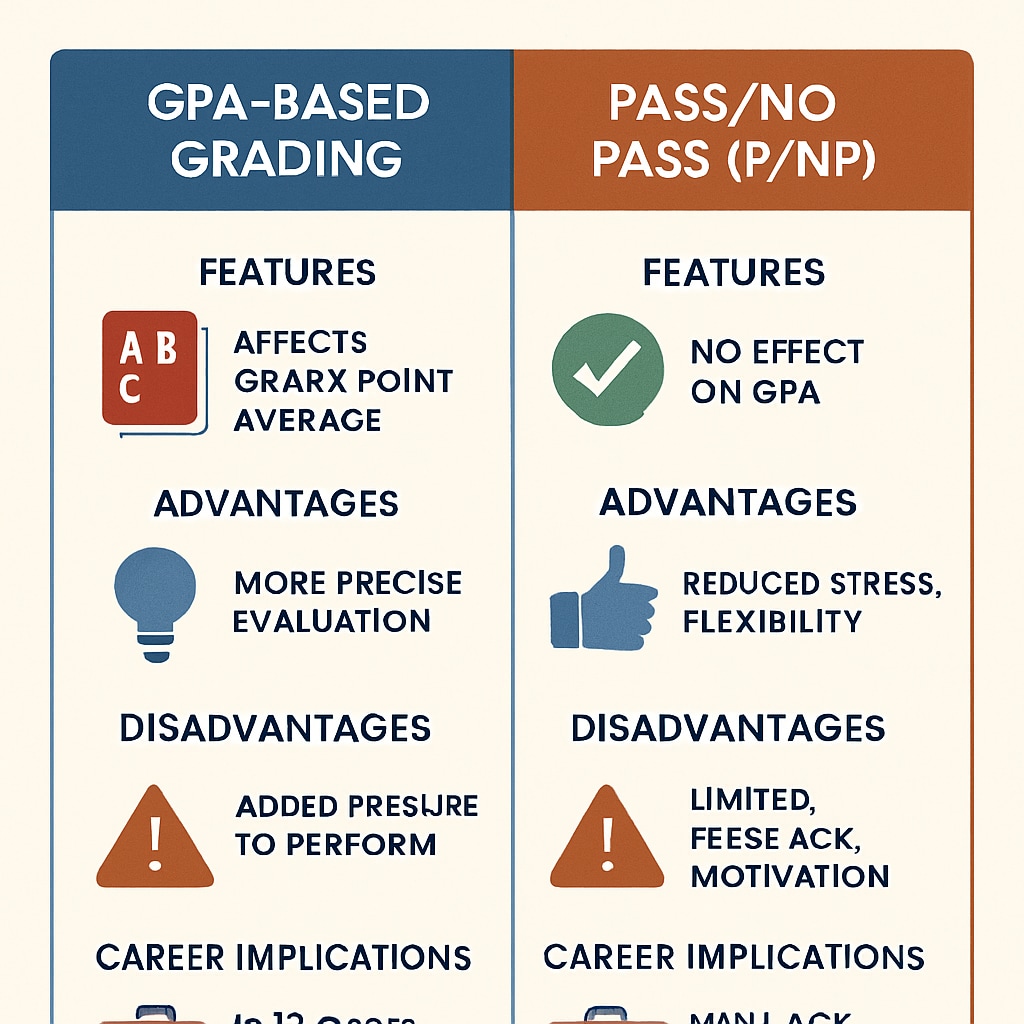For university students, the choice between GPA-based grading or the Pass/No Pass (P/NP) option often sparks a critical debate. While GPA scores are considered a benchmark of academic excellence, the flexibility of P/NP can help students manage stress and explore diverse subjects. But how do these choices impact career competitiveness? This article explores the trade-offs of selecting GPA or P/NP grading systems and provides a balanced framework to make informed decisions.

Understanding the Foundations: GPA vs. P/NP Grading
Before diving into career implications, it’s essential to understand what these grading systems entail. GPA, or Grade Point Average, is a numerical representation of academic performance, calculated on a scale (usually 4.0). It’s widely used by employers and graduate schools to assess a candidate’s academic rigor, consistency, and capability.
On the other hand, P/NP grading allows students to receive a Pass or No Pass instead of a traditional letter grade. This system is particularly appealing for courses outside a student’s core area of expertise or for those seeking to alleviate academic pressure. However, P/NP grades do not contribute to the cumulative GPA, making the decision to opt for this system more strategic.
Both options come with distinct advantages and challenges, which we’ll explore in the context of employment and career growth.
Career Implications of GPA: A Double-Edged Sword
Employers often view GPA as a quick indicator of a candidate’s academic discipline and intellectual capacity. For competitive industries like finance, consulting, and tech, a high GPA can serve as an essential screening criterion. According to a report by the National Association of Colleges and Employers (NACE), many employers list GPA cutoffs (e.g., 3.0 or higher) when recruiting entry-level employees.
However, relying solely on GPA has its limitations. A high GPA might not accurately reflect real-world skills such as teamwork, leadership, or problem-solving. Moreover, prioritizing GPA can lead to stress and burnout, particularly for students juggling extracurricular activities or internships.
The Flexibility of P/NP: Boon or Bane for Career Aspirations?
P/NP grading offers students the freedom to explore challenging or unrelated courses without the fear of negatively impacting their GPA. This can be particularly valuable for personal growth and interdisciplinary learning, both of which are increasingly valued in today’s job market.
However, the P/NP system comes with risks. Employers and graduate programs may question a transcript filled with P/NP grades, interpreting it as a lack of commitment or an attempt to avoid academic rigor. Additionally, some companies and industries might explicitly require a GPA for their application process, leaving students who leaned heavily on P/NP at a disadvantage.
Balancing the Two: A Strategic Framework
When deciding between GPA and P/NP grading, students should consider the following factors:
- Career Goals: For industries that prioritize academic excellence, such as law, medicine, or engineering, maintaining a strong GPA is crucial. Conversely, creative or entrepreneurial fields might value diverse experiences over numerical scores.
- Course Difficulty: Opt for P/NP in courses that are highly challenging or outside your expertise, especially if they are not directly relevant to your career goals.
- Stress Management: If maintaining a high GPA is causing undue stress, consider using P/NP sparingly to strike a healthier balance.
- Graduate School Aspirations: Many graduate programs have GPA benchmarks. If graduate school is in your future, aim to preserve a competitive GPA.
By carefully assessing these factors, students can make informed decisions that balance immediate academic needs with long-term career aspirations.

Conclusion: Making the Right Choice
The decision between GPA and P/NP grading is not one-size-fits-all. Both systems have their unique advantages and drawbacks, and their impact on career competitiveness depends on individual circumstances. While GPA remains a key metric for many employers, the P/NP option can provide vital flexibility and mental well-being. Ultimately, the best approach is to align your academic choices with your professional goals, personal interests, and mental health priorities.
In a world where career landscapes are increasingly dynamic, the ability to adapt and make strategic decisions will serve students well—both in the classroom and beyond.
Readability guidance: This article uses concise paragraphs, active voice, and accessible language to ensure clarity. Short sentences and bullet points highlight key information, while transitions enhance flow and readability.


